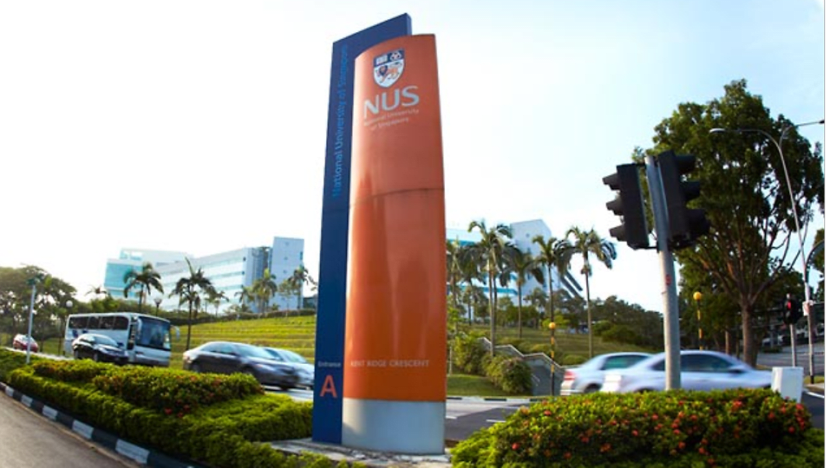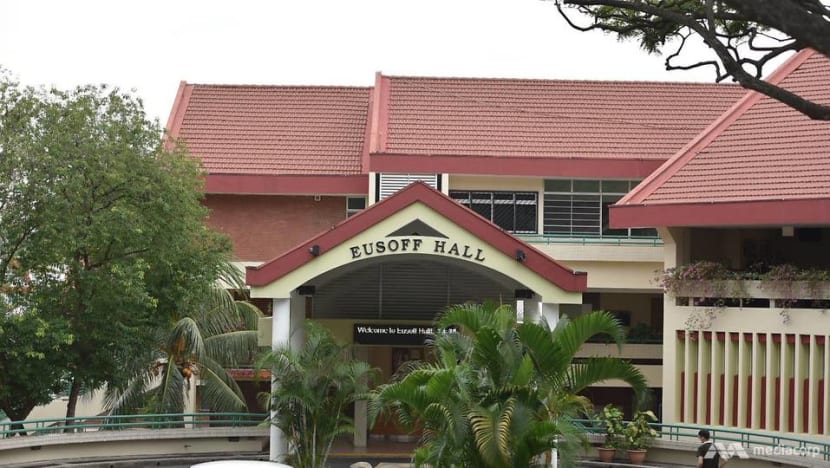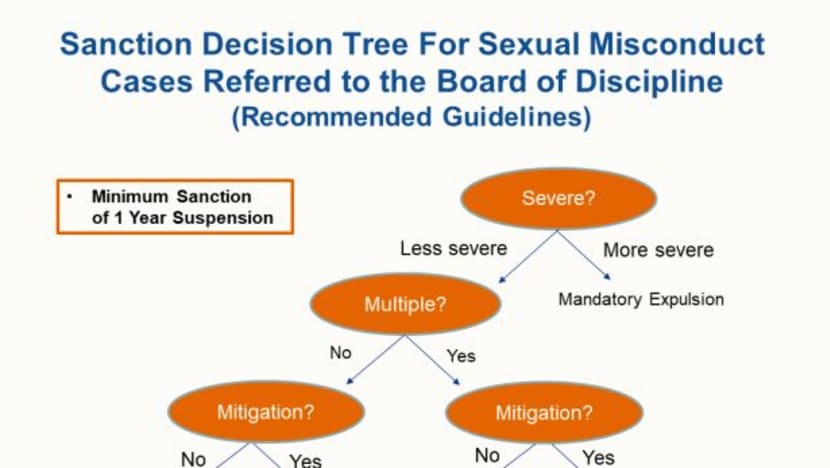12 NUS students would have been expelled if new, tougher sanctions for sexual misconduct were in place

File photo of the National University of Singapore.
SINGAPORE: A review committee on sexual misconduct at the National University of Singapore (NUS) said the current sanctions did not act as a “strong deterrent” and that 12 offenders would have been expelled under its tougher new framework.
The school convened a review committee in April this year after undergraduate Monica Baey called for tougher sanctions against a fellow student Nicholas Lim, who filmed her in a hostel shower. Education Minister Ong Ye Kung had previously called the penalties “manifestly inadequate”.
In the committee’s report on Monday (Jun 10) to the NUS Board of Trustees, seen by CNA, they said there was a “significant number of sexual misconduct incidents every year” at NUS and concluded that the current sanctions framework for serious offences “does not act as a strong deterrent against such offences”.
It also listed out the problems with NUS’ current framework and the “gaps in victim support”.
The board said on Monday it accepted the committee’s recommendations “in full” and that they were “informed, balanced and robust”.
These recommendations included immediate expulsion for severe sexual misconduct cases and that offenders will have a notation of the length of their suspension on their academic transcripts.
READ: NUS' penalties for sexual misconduct case were 'manifestly inadequate': Ong Ye Kung
VICTIMS HAVE “MINIMAL” SAY ON DISCIPLINE PROCESS
The committee listed out the issues with NUS’ current framework after reviewing sanctions that were meted out by the Board of Discipline (BOD) over the last three years.
It noted that the discipline board had “emphasised offender rehabilitation, rather than punishment and deterrence”.
“As a consequence, after considering mitigating factors, the sanctions imposed were less stringent than those recommended in the guidelines,” the report read.
The committee noted that the situation around sexual misconduct “has not improved”.
It added that while NUS’ existing processes were “systematic with clear processes”, it lacked empathy and support for victims.
First responders, such as campus security officers, resident fellows and advisers were not trained to assist victims and they were often male. Most victims were female and may feel uncomfortable speaking to male first responders.

It also said the current NUS process does not require a victim’s statement before the BOD started its proceedings, adding that victims were not kept up to date with the proceedings and only informed of the outcome over the phone.
“Victims have a minimal voice in the current disciplinary process and are also not well supported during the process,” the committee wrote in their report. The BOD is also not gender balanced, they added.
Offenders should not write a letter of apology to the victim as a penalty measure, the committee said, as it may “inadvertently trigger unwanted memories” for victims.
Nicholas Lim, who filmed Ms Baey in the shower, was given a 12-month conditional warning by the police and suspended for a semester, among other sanctions. He was also told to write a letter of apology to Ms Baey.
READ: The Big Read: Singapore’s voyeurism problem – what’s wrong with men, or the world?
12 WOULD HAVE BEEN EXPELLED
In their analysis of 25 cases at NUS over the last three years, all but one would have received tougher punishment under the new framework, the committee said.
Of the 25 cases at NUS, 12 students would have been expelled if this tougher new framework was in place. Another four would have received two-year suspensions, and eight would have received one-year suspensions at least. There was insufficient evidence in the last case.
All five offenders who were sentenced to prison would have been expelled under the new framework.
Sanctions recommended by the committee includes a minimum one-year suspension that the BOD or appeals board cannot override, and mandatory expulsion for more severe cases - including multiple cases of sexual misconduct with no mitigating factors.
“The committee agrees with what many stakeholders and the public have said - that it is timely for NUS to implement tougher sanctions for sexual misconduct,” the report read.

PREVIOUS CASES WILL NOT BE LOOKED AT
The committee said previous cases for which sanctions had already been meted out - such as Ms Baey’s case - cannot be reopened.
“The committee has also consulted with external legal advisors and determined that past cases on which the BOD had formally ruled, and for which sanctions have been meted out, cannot be reopened,” the report said.
“Our recommended changes will form the basis of the university’s tougher stance on sexual misconduct and discipline going forward.”
It called for victims to have more say on the disciplinary proceedings going forward, such as being kept up to date and asking for a statement of facts and impact statement.
Under NUS’ current framework, the discipline board can begin proceedings without the victim’s statement of facts.
“To ensure that the victim’s voice is always considered, the committee recommends that the victim’s statement be a requirement for the BOD to proceed, unless the victim specifically decides against providing a statement,” the committee said.
“In addition to the statement of facts, victims should be allowed to submit other documents relating to the case, such as impact statements and/or medical reports.”
SOME CASES HANDLED BY HEAD OF UNIT
The committee said all complaints or allegations will be considered a possible serious offence and must be referred to the Provost.
The Provost will then decide which allegation will be looked at by the BOD or the head of an academic or non-academic unit.
Some cases - which must be single incidents only - may be handled by the head of unit instead of the BOD. Some examples include:
- Attempting an unwelcome kiss on a date
- Planting an unwanted kiss on the cheeks of a person
- Stroking another person’s face without consent
- Giving an unwanted massage on the arms of a person
- Briefly holding the waist or shoulder of a person without consent
- Using expletives such as “slut” or “whore”
- Staring inappropriately at the breasts of a person
- Stealing undergarments
RECOMMENDATIONS ACCEPTED
On Monday, the chairman of the NUS Board of Trustees Hsieh Fu Hua said: “The board accepts the committee's recommendations in full. We feel that the recommendations are informed, balanced and robust.
"It reflects our community's common desire for tougher penalties for offenders and greater support for victims, and for fostering an enduring culture of respect and support on campus."
There were 10 recommendations, including a minimum one-year suspension, which cannot be overridden or removed by the BOD, as well as immediate expulsion for "severe instances or aggravated forms of offences of sexual misconduct".
It was also recommended that offenders have a notation of the length of their suspension on their academic transcripts, which can be expunged three years from the offender's date of degree conferment.
To guard against reoffending, offenders must also be certified fit by a counsellor and/or medical professional before they are allowed to return to campus after suspension. A "no-contact protocol" would also be established.
READ: NUS accepts recommendations by review committee on sexual misconduct
Mr Ong said: "It has been a difficult period for the NUS community, but by taking swift and decisive action, NUS will emerge stronger and better.
"The other institutes of higher learning are also conducting their reviews, and (the) Ministry of Education, Singapore will continue to work with them to help ensure a safe and supportive environment for our students."














